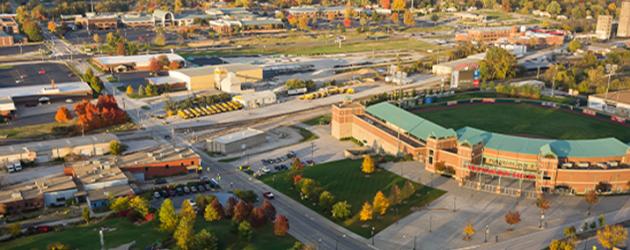It’s about the food, but really, it’s about something greater at Millsap Farms, a place where passion grows on a 20-acre plot of land in northeastern Greene County.
The hands helping turn the dirt belong to Curtis and Sarah Millsap, a husband and wife who took a former nursery and transformed it into a place of community, life and education.
Because beyond the produce, the farm offers opportunities to learn: How food is grown, why it’s important, and its ways of connecting people.
“I hope they come away from here with a sense of belonging,” says Curtis of one thing he hopes visitors glean from the farm. “That they know where they belong in the ecosystem, where they belong in the community, where they belong in the hearts and minds of their friends.
“I don't pretend that we can create that, but I hope they look at what we've got going and they go, ‘Yeah, that's right.’ That relationships with people matter more than anything else. That being in nature matters a lot, and we should pursue that – and if we're going to be in nature, then we should do our best to keep it clean, keep the space beautiful, keep the diversity.”
Examples of those connections include the farm’s Pizza Club, which brings visitors together on Thursday evenings May through October; monthly farm walks, given in connection with Springfield Community Gardens; and its Community Supported Agriculture (CSA) program, which carries a work commitment of 12 hours each season. That knowledge and education is part of feeding the community, too.
“This is not an easy way of life,” says Curtis. “But it is a wonderful way of life.”
Starting Millsap Farms
There’s a sign along “old” Highway 65 north of Springfield that directs visitors to Millsap Farms, where visitors can stop at a farm stand and buy produce honor-system style via cash or QR code.
Near coolers — at one moment, filled with rosemary, leeks, celery, pea shoots, sage, figs, khal rabi, fennel, radishes, carrots, zucchini, cucumber and more — is a sign of greater things: A mission-minded piece of metal, hanging on the wall, and on which these words are painted: “We grow food to connect people, our community and creation.”
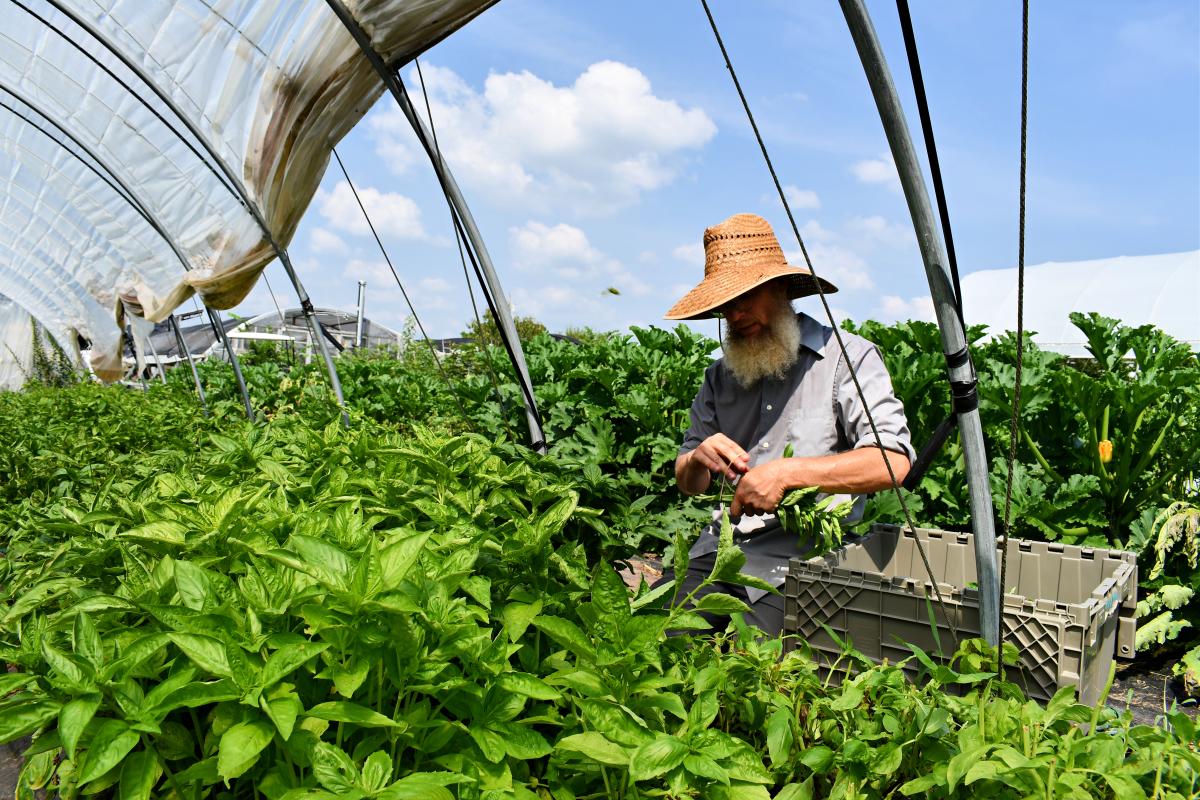 Curtis Millsap picks basil in August 2023.
Curtis Millsap picks basil in August 2023.
Out back, Curtis picks basil from beneath a high tunnel on a sunny and scorching August afternoon.
Weather doesn’t stop farmers, nor are Ozarks seasons a surprise to Curtis, who was born and raised in the Queen City of Springfield. He’s one generation of several in his family to call the area home.
The years between high school graduation and picking basil are complex. There was time away in states including Arkansas, Colorado and New Mexico; the Millsaps meeting and marrying; working in outdoor spaces; the couple’s fostering, adopting and creating 10 children; and a move back to the Ozarks a little more than 20 years ago.
But things had changed, a realization made in perhaps many ways. A clear one was from a cloud that descended over the family — literally.
“I got back to Springfield, unpacked my blacksmith stuff, and fired up the forge down there in Rountree,” Curtis says of an urban neighborhood in the middle of the city. “This black cloud of smoke lifts up and goes over the neighbors’ yard, and it’s like, ‘Oh, this isn’t an urban hobby, is it?’”
That general awareness and divine direction led them out into rural Greene County.
“I spent a lot of time in those years on my knees in the mornings, praying, reading scripture and asking, ‘What am I supposed to be doing? Where is this headed?” says Curtis, who at the time was working in construction.
The couple initially bought some land — not too far from where he now stands — but realized it wasn’t quite what they needed. One day, a drive led Sarah to their current acreage, which had at one time been a nursery.
“We would never again in our lives qualify for a mortgage like this, but back in the day we could, so we were able to buy it and it had a lot of infrastructure already here,” says Curtis. “It was flat and level and deep soils and a great well and great house and all that stuff. That was 2007. We bought this place and started that fall with some pastured poultry, and the next spring started doing CSA with 25 members, and then that just grew.”
Today, the farm has about 230 members, which includes approximately 70 new additions from Urban Roots Farm. The latter entity recently announced it was discontinuing work in Springfield and its owners, relatives of the Millsaps, were putting all energy into a farm in northwest Arkansas.
Why does local farming matter?
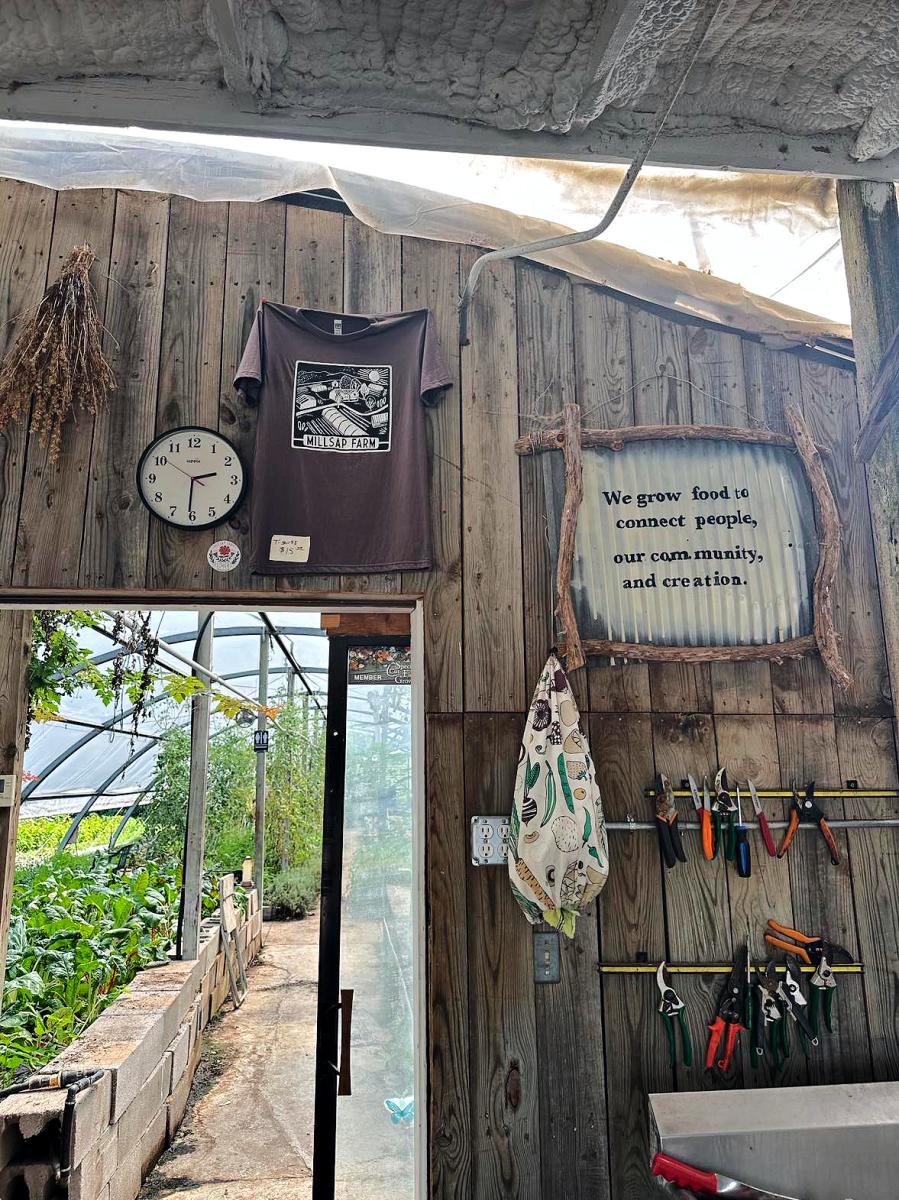
Remaining mission-minded at Millsap Farms.
At least at times, large grocery chains sell food at a lower cost than what’s locally grown, but perhaps it’s a reflection on the old wisdom that you get what you pay for. Produce’s nutritional value can decrease with time from harvest, and incurs costs — literal and to the environment — with the effort it takes for transportation.
Those realities are also a shift from the region’s cultural past, notes John Ikerd, professor emeritus of agricultural economics at the University of Missouri-Columbia.
“When I was growing up in south Missouri in the 1940s and early 1950s, our family’s food system was essentially local,” he wrote in 2017 for a presentation at the Focus on Farming Conference. “I would guess close to 90% of our food either came from our farm or was produced and processed within less than 50 miles of our home. There were local canneries, meat packers, and flour mills to supply grocery stores and restaurants with locally grown food products. Over the years, however, the local canneries, meat packers, and flour mills consolidated into the giant agribusiness operations that dominate today’s global food system. Supermarkets and fast-food chains replaced the mom-and-pop grocery stores and restaurants.”
As a flip to that shift, the Millsaps’ CSA program gives a chance to regularly partake of the farm’s bounty, but also to learn more about the benefit of local food in both taste and nutrition. To participate, there’s a per-delivery cost for each share of the harvest — available weekly or bi-weekly — which can be customized for the amount of produce one wants to receive. There are also available add-ons for products like cheese and meat.
In addition to the financial investment, CSA members are asked to complete a 12-hour work commitment per season for participation. While there is an option to buy out that requirement, the Millsaps say connecting members with the farm helps provide a new level of experience, awareness and understanding with the growing process.
“What we found is people who do that, at least a few times, have a much higher retention rate,” says Curtis of members who work hours on the farm. “Because they get it. ‘Oh, yeah, that's why carrots cost that much. That's why tomatoes don't always happen – or if they do happen, they're not cheap. Because it's really hard work.’”
And it’s a team effort among many people. As Curtis talks, Sarah heads out with an SUV full of tubs for CSA orders. A representative from Springfield Community Gardens comes to pick up those bunches of basil. Children — some of the Millsaps’, and some of friends — help with farm chores. Radio messages come in; one asks about what to do about a wandering Black Widow. (Stay away.)
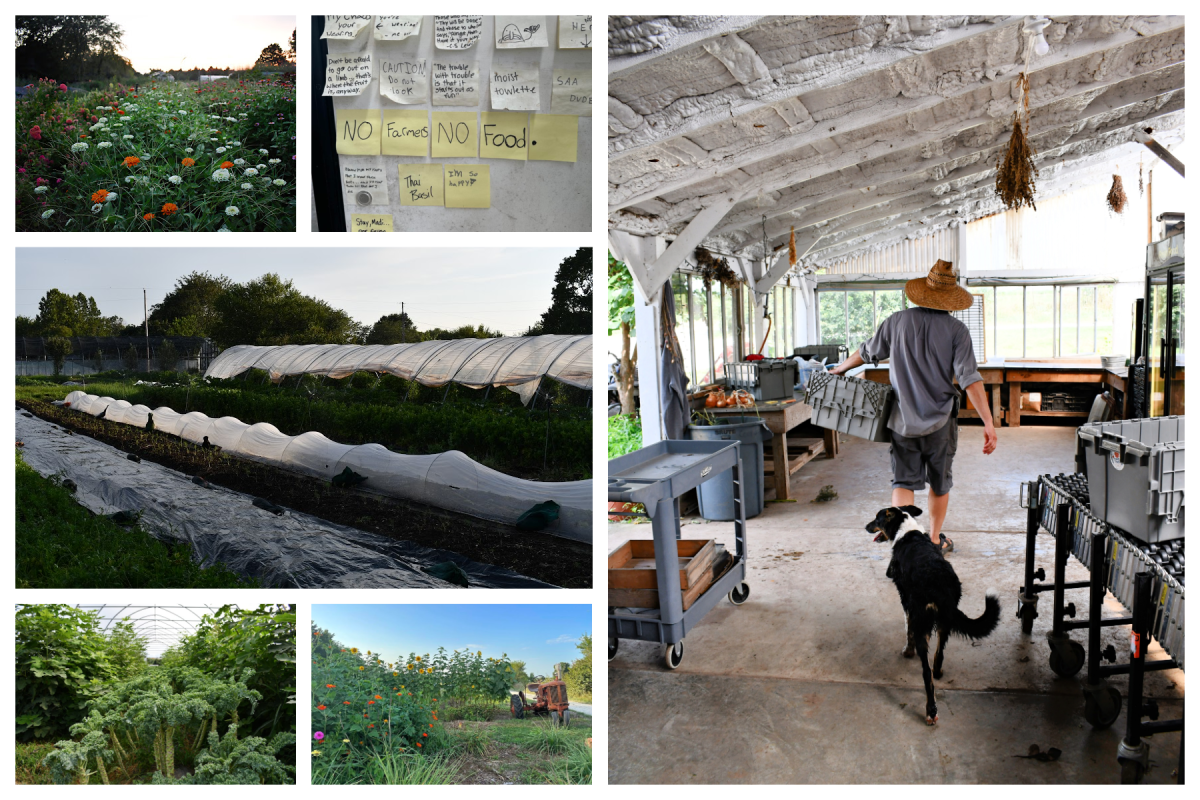
Beyond each meal, the effort is part of a greater effort to help increase awareness and education about the need for locally grown food.
“I think that's just human nature. We’re slow to trust things, which is probably wise,” says Curtis. “But we have to have several personal experiences before we really buy it. When you think about any life change, I mean, think about people who don't believe in love — until you meet that person, or until you have that experience.
“But that's not the way our culture has moved things. So we've been busy for a long time educating people. We talked about all the different ways people come to us – but a lot of those interns, they come to us from that perspective; like, ‘I really want something different. I want to try this life. And then maybe I want to build this thing myself.’ And so we've over the years had probably 40ish people who stayed for a couple of months at a time up to a couple of years. And a lot of them have gone on to start their own farms.”
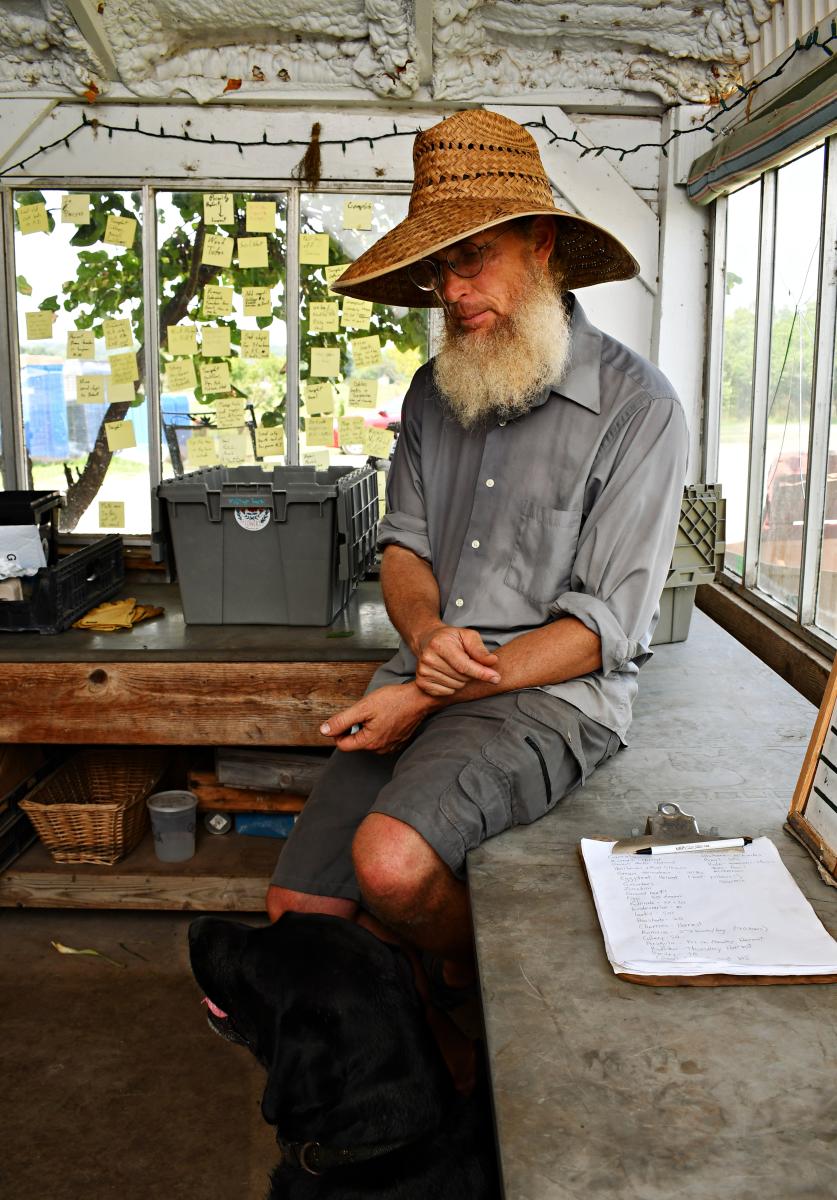
Curtis Millsap pauses for a moment in the farm stand as CSA orders head out for delivery.
One of those individuals is Jeff Barry, who interned at Millsap Farms for several months starting in 2009.
“He didn't know me from any other person,” Jeff says of Curtis. “I was a young person, just showing up, and he didn't rush me at all. He was very open to having me be there, and telling me the reasons why he was doing the things he wanted to do and what was important to him. He was definitely a welcoming person, wanting to involve other people in whatever capacity — and not just on his place, but engage in that space.”
For several months, Jeff would take off work on Fridays — back then, he was a district executive for the Boy Scouts — and sleep on the Millsaps’ couch for two nights a week while he worked on the farm.
The experience unfolded alongside a search for land by Jeff and his wife, Rachel Barry, which was ultimately found in rural Douglas County. Today, the family’s efforts straddle the line between homesteading and farming, among other links with the literal business of local food: Jean’s Healthway, a natural food store in Ava that the couple also owns.
“I would say farmers don’t typically know the expectations of retail,” says Rachel, who has a long connection with the store before purchasing the business in late 2020. She shares those realities include consistency of products and quality. “(Curtis) is extremely valuable because he knows all the barriers.”
“I would say for Springfield, they are the foundation for local food as far as produce is concerned,” Jeff adds of Millsap Farm. “As far as veggies, there is no other foundational farm that has been there as long and is as accessible.”
Connecting for greater good
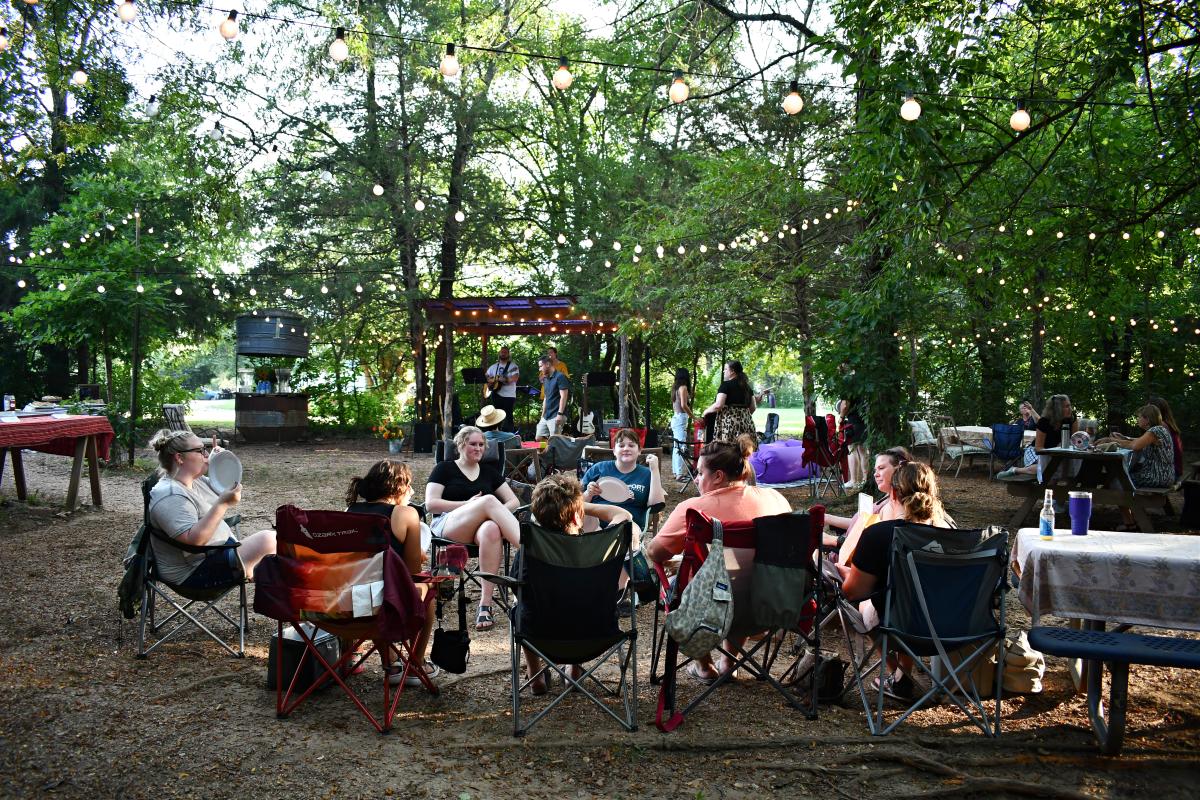
Millsap Farms’ Pizza Club is shown in August 2023.
Fulfilling that realization is done in other ways through Millsap Farms. One is through the farm’s Pizza Club, which is held weekly May through October, and connects guests with pizza, music and community. Four varieties of pizza are made each week, each featuring seasonal produce and local meats, cheeses and sauces.
They’re made and baked on the farm before guests’ eyes, going from dough to done in about three minutes thanks to a handmade New Mexico-style Horno wood-fired earthen oven at about 800 degrees.
Served buffet-style, participants fill their plates before sitting among twinkle-light-adorned trees and the sounds of live music from local artists. The event is considered so special that it’s been written about numerous times by media outlets (even from beyond the Ozarks) and was included in Ozarks Alive’s original “Passport to the Ozarks” guidebook.
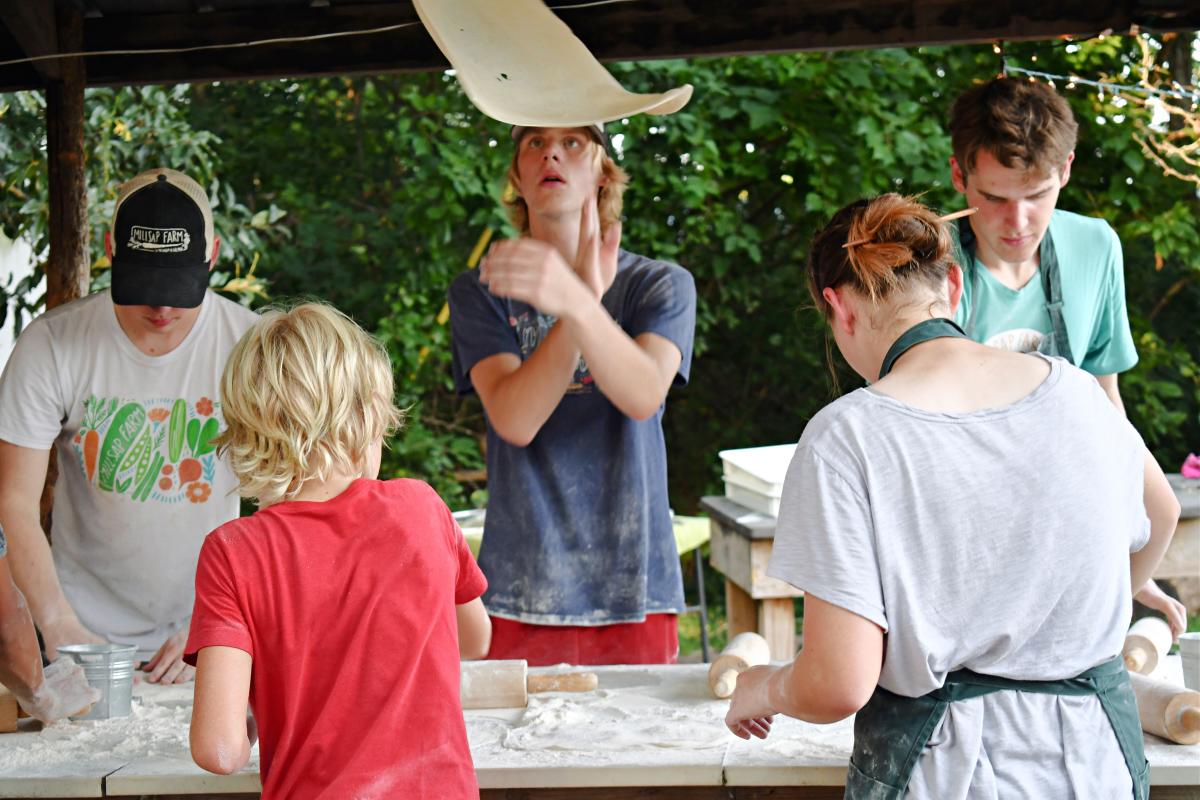
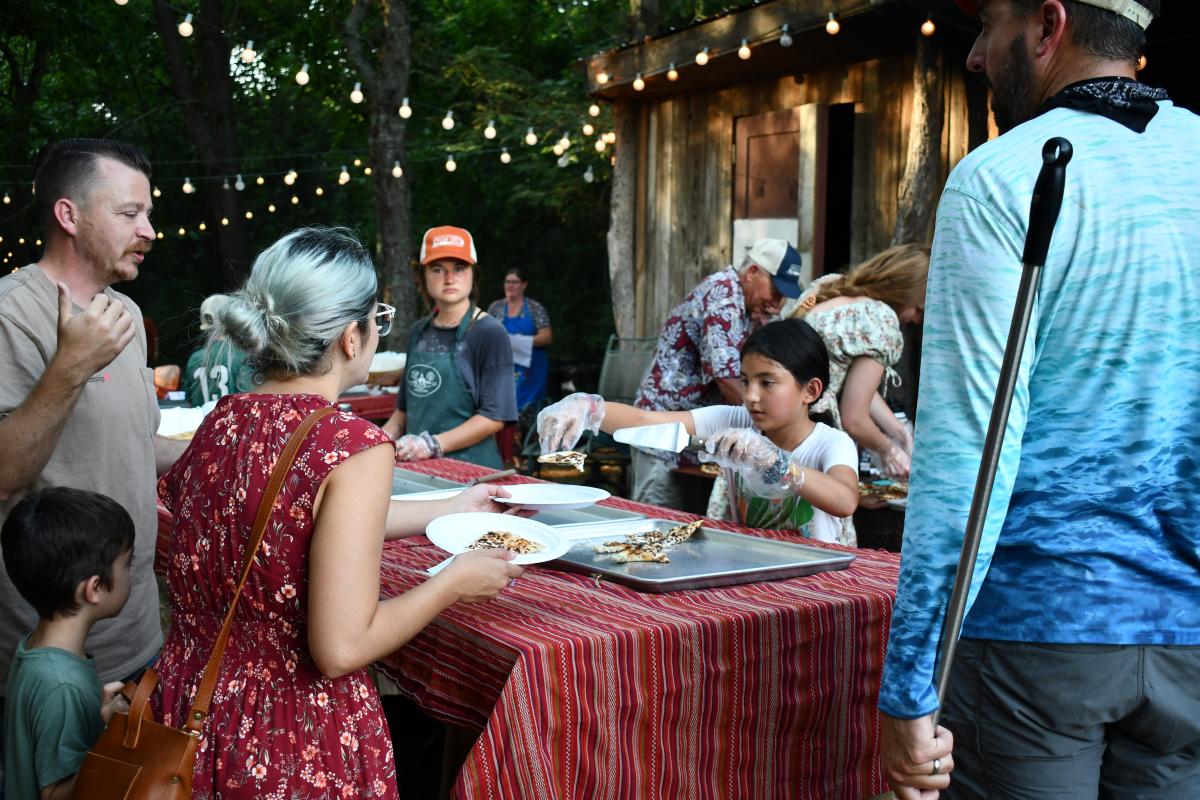
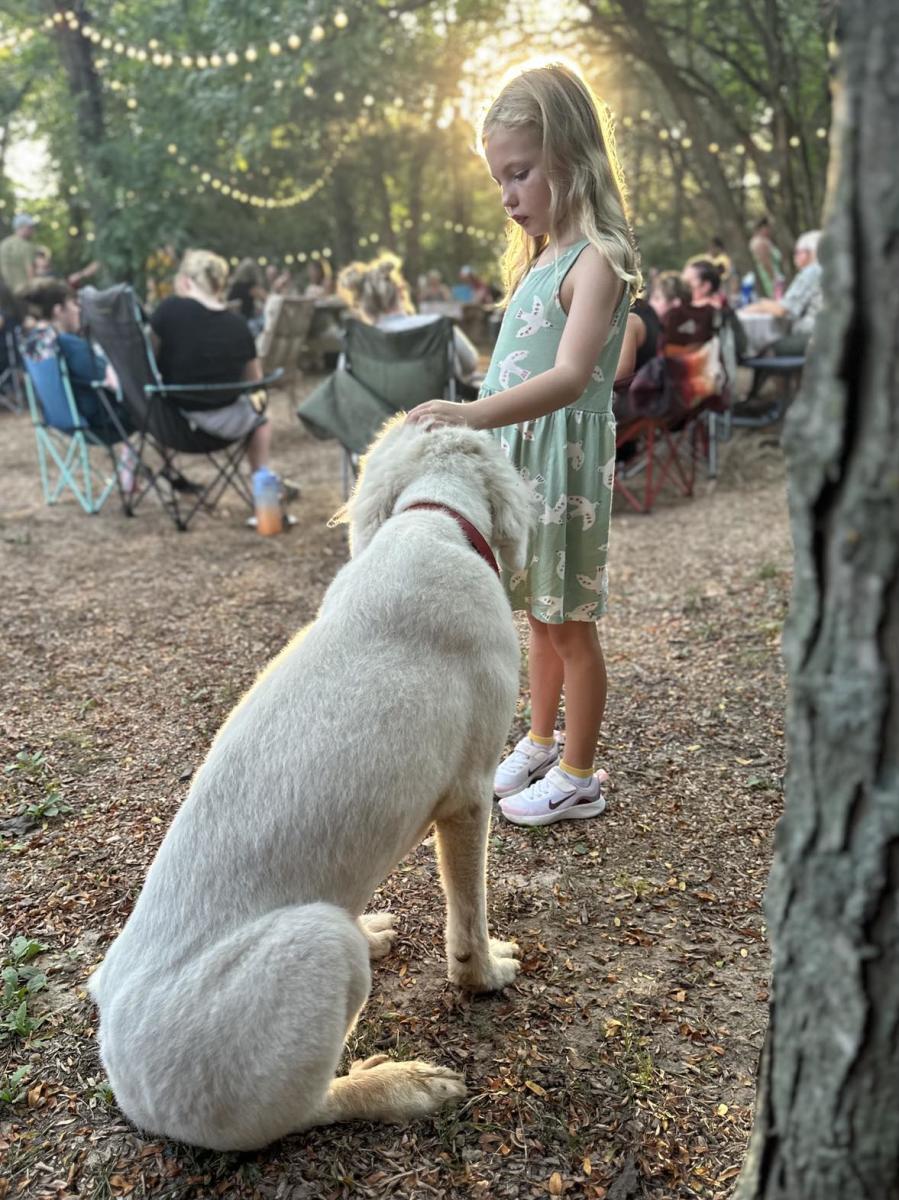
“We love hosting families,” says Curtis. “Sometimes it's three generations – grandparents, parents and kids. And to see them all just have a place where everybody can be comfortable, and enjoy the music and the food, and the kids are out there playing in the lawn, and then adults can sip wine in the shade. That's pretty special, pretty unusual.”
Those attendees run the spectrum: There are folks like Anne Colvin of Ozark who attended on a recent Thursday for the first time — “It was delicious,” she says — to others like Andy King and his family, who have been coming for years.
“He knows this place like the back of his hand. As soon as we got here, he wanted to run out there where all the kids’ stuff was,” says Andy of his young son, Arlo. “He always likes to see the animals and check on the cats.”
But beyond those things — and Arlo’s need to also check in on the welfare of Ruby, a great Pyrenees who, despite the loss of a leg, enjoys mingling with guests on the farm — the mission that brings the Kings back is more meaningful than just a fun evening.
“The pizza’s great, and the way they’ve set things up with the music and the lighting is great, but I really just appreciate the way that they operate,” says Andy of the Millsaps. “I want to support that. He’s got a really awesome setup with it being more of a community farm, and how they’re raising up a new generation of people to work.”
Touring Millsap Farms
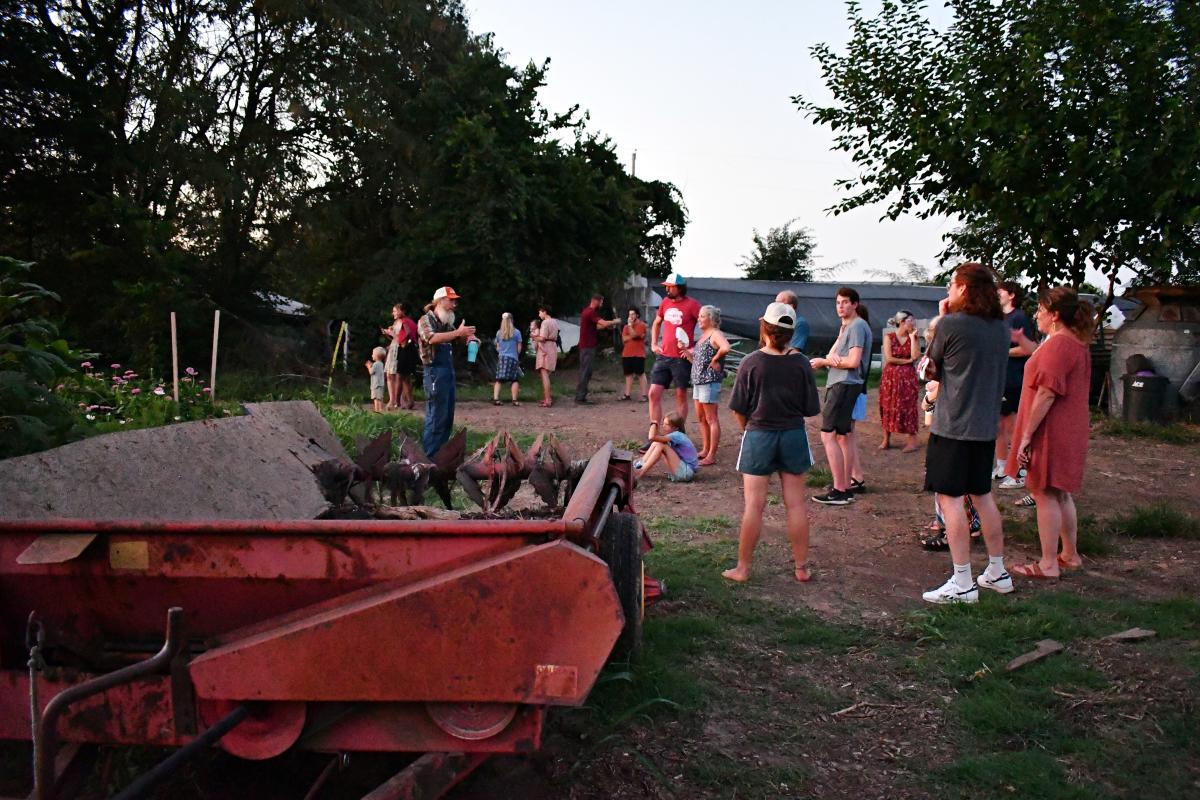 Curtis Millsap leads a walk around Millsap Farms for visitors in August 2023.
Curtis Millsap leads a walk around Millsap Farms for visitors in August 2023.
Some of those visitors for Pizza Club gathered at dusk for a quick tour with Curtis, who gave an overview of the farm and showed visitors the high tunnels, flower fields and hog pen.
“We’re a community farm, and that’s why you all are here, and that’s a big part of how we do business,” Curtis shares with the group. “We’ve always been very engaged with the community around us, and inviting people out to the farm, and going into the city and interacting through cooking classes, farmers markets and things like that.
“We do all this organically. That means we don’t use synthetic pesticides, herbicides or fertilizers. Instead, we focus in on the health of the soil and we feel like that provides healthy plants and, in turn, makes for healthy people.”
That decision, he tells the group of people, critters and creatures gathered in the dusky twilight, wasn’t necessarily as much against the chemicals as it was in protecting the people he loves.
“I wanted to be able to farm alongside my kids. And I realized farming alongside your kids would kind of by nature say you don’t want to spray stuff that could kill your kids. It’s basic, but — we like to say, ‘We’ll grow them without the pesticides. If you want to add them when you go home, that’s fine,” he says, leading to chuckles throughout the group and stops showing other spots on the farm.
Those Pizza Club walks aren’t the only times the public is welcome to come to Millsap Farms to learn more about sustainable agriculture.
Monthly Twilight Walks are an easy way to learn more about specific topics. For example, on Sept. 27, the topic is agritourism; in October, it’s overwintering crops – the concept of preparing and protecting crops that need additional support during colder months to survive.
The walks are generally held on the third Wednesday of the month from 6 to 8 p.m. However, from November to March they are on the third Saturday from 1 to 3 p.m. No registration is required.
“We also walk the whole farm and we look at what's happening, what's growing, what transitions are happening; issues we're facing, irrigation, that sort of stuff,” says Curtis, who says that the spectrum of attendees ranges from folks with a big garden to others who are starting to grow and sell items.
“We've got this wide range of learners coming out. And then I get to share, but also help them connect. So we always have a little intro or what are you doing here? And there's always these conversations that happen. ‘Oh, you're just around the corner for me, and here's what I'm doing.’ And ‘I'd love to hear more about what you're doing.’”
The events were initially held in connection with the University of Missouri Extension, but now are tied to Springfield Community Gardens, which applied for grant funding to support the events — making them free to attend — and sees the local collaboration between farms to be an important reality.
“Springfield Community Gardens’ vision is a community where everyone has access to healthy, local food. The best way to get people to eat healthy, local food is to have that food available to them, and (show them) how it’s grown, and to connect with their community around foodways and what people eat and why.” says Maile Auterson, founding executive director of SCG.
“The farm walks allow people to get to know their farmer and how food is grown, but they also help people connect, even in the farming community. A lot of those farm walks are attended by other farmers, so they’re learning from Curtis how he does things, so there’s mentorship involved.”
It’s part of a greater goal, one beyond even the next meal or season.
“We serve about 4,000 people. I've always said there's room for another 99 farms like us around Springfield,” says Curtis. “Because, I mean, if you just do the numbers, with a metro area of 400,000 – well, we should all be doing that. Everyone in Springfield should be interacting with a farm on a daily and weekly basis. That's where food comes from. Why would we not?”
Want to learn more?
To learn more about Millsap Farms, click here.
The creation of this story is funded by a partnership between Ozarks Alive and I Love Springfield, MO!, formally known as the Springfield Missouri Convention & Visitors Bureau.








